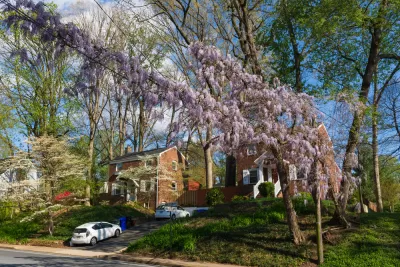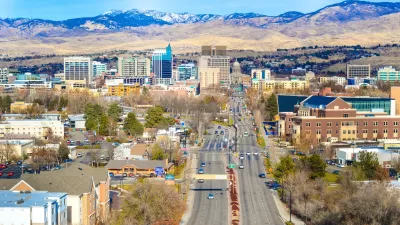A lawsuit brought by residents charges the county with failing to follow statutory procedures and provide accurate information about recently passed ‘missing middle housing’ reforms.

After Arlington County, Virginia loosened zoning restrictions to encourage more ‘missing middle housing’ construction in March, becoming the first jurisdiction in the D.C. region to end exclusive single-family zoning, ten residents banded together to sue the county in an effort to reverse the decision.
As Amanda Michelle Gomez writes in The Washington Post, “The lawsuit against Arlington’s county board and planning commission alleges local lawmakers failed to initiate upzoning in accordance with the law and seeks to halt reforms that are set to begin in July.”
The approved plan would allow for buildings of up to six units on previously single-family lots as part of an effort to create more badly needed affordable housing, but critics expressed concerns about strain on parking and stormwater infrastructure, lost trees, and school overcrowding.
According to Gomez, “The 162-page lawsuit accuses the board of not being ‘forthright’ with residents when explaining the purpose of missing middle, including inaccurately characterizing the proposal as limited in scope, as well as not conducting detailed studies on impact.” Residents of Fairfax County successfully sued to void zoning reforms in that county this year under similar claims.
FULL STORY: Ten Arlington Residents File Lawsuit Against County’s ‘Missing Middle’ Zoning Change

Planetizen Federal Action Tracker
A weekly monitor of how Trump’s orders and actions are impacting planners and planning in America.

Restaurant Patios Were a Pandemic Win — Why Were They so Hard to Keep?
Social distancing requirements and changes in travel patterns prompted cities to pilot new uses for street and sidewalk space. Then it got complicated.

Map: Where Senate Republicans Want to Sell Your Public Lands
For public land advocates, the Senate Republicans’ proposal to sell millions of acres of public land in the West is “the biggest fight of their careers.”

Maui's Vacation Rental Debate Turns Ugly
Verbal attacks, misinformation campaigns and fistfights plague a high-stakes debate to convert thousands of vacation rentals into long-term housing.

San Francisco Suspends Traffic Calming Amidst Record Deaths
Citing “a challenging fiscal landscape,” the city will cease the program on the heels of 42 traffic deaths, including 24 pedestrians.

California Homeless Arrests, Citations Spike After Ruling
An investigation reveals that anti-homeless actions increased up to 500% after Grants Pass v. Johnson — even in cities claiming no policy change.
Urban Design for Planners 1: Software Tools
This six-course series explores essential urban design concepts using open source software and equips planners with the tools they need to participate fully in the urban design process.
Planning for Universal Design
Learn the tools for implementing Universal Design in planning regulations.
Heyer Gruel & Associates PA
JM Goldson LLC
Custer County Colorado
City of Camden Redevelopment Agency
City of Astoria
Transportation Research & Education Center (TREC) at Portland State University
Camden Redevelopment Agency
City of Claremont
Municipality of Princeton (NJ)





























